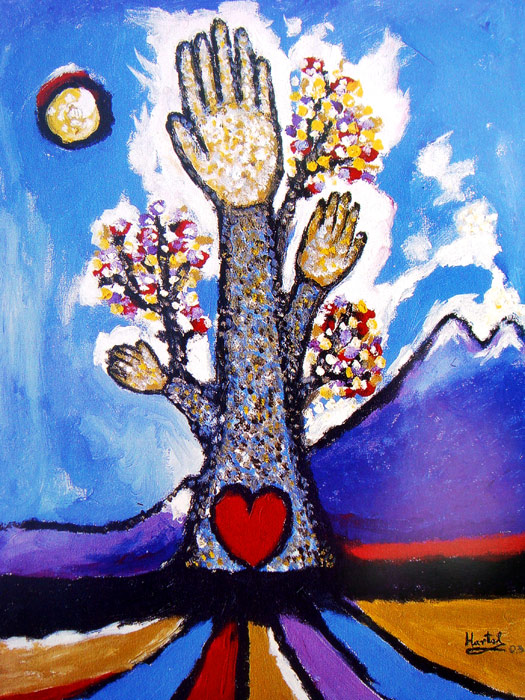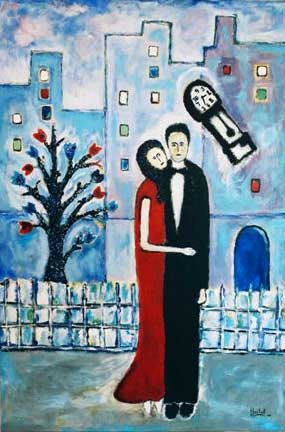
‘Tree of Life with Six Fingers’ – Paul Hartal.
By Paul Hartal.
I believe that the esoteric revelations in Pascal’s triangle are embedded in the holographic structure of the transcendental cosmos, because the whole is present in every part. Thus, the hidden message emanates from the omnipresent fabric of the spiritual world, from the intrinsic quality of its fractal, self-similar nature. This nature is enmeshed through the universe with ineffable mysteries, with blessed meanings, with the splendour of sacred love and the radiance and glory of the Divine Creator.
As to the problem of the relationship of religion and mathematics, it is certainly intriguing, as well as controversial. Can mathematics be designated as a religion? About 25 centuries ago the Greek philosopher and mathematician, Pythagoras, viewed numbers as sacred elements, the building blocks of the universe. He founded a religion based on numbers, worshipping the Tetractys, a geometrical figure with 10 points, arranged on a triangle in four rows.
It is also noteworthy that, without actual empirical proof, mathematicians have persuasive faith in their numbers. Although numbers don’t grow on trees and are inventions of the human mind, mathematicians believe, for example, in the reality of zero, the reality of infinity and the square root of minus one. The physicist Eugene Wigner, a Nobel laureate, stressed “the unreasonable effectiveness of the language of mathematics”. He called it “a miracle” that allowed formulating the laws of physics, “a wonderful gift which we neither understand nor deserve”.
> Related: ‘Mathematics and Reality’ by Paul.
Consider also that the eminent physicist Heinrich Hertz in the 19th century held that mathematical formulas had an independent existence and an intelligence of their own. He maintained that equations were wiser than their discoverers, and that we get more out of them than was originally put into them.
One of the most significant mathematicians and logicians in history, Kurt Gödel (1906-1978), published his two incompleteness theorems in 1931 at the age of 25, one year after he finished his doctorate at the University of Vienna. The theorems proved that if a mathematical system is consistent it cannot be complete and that within their own framework the consistency of axioms cannot be proven.

‘Time Does Not Exist: Love is Eternal (blue version)’, 2005, 91cm x 61cm approx, acrylic on canvas. Paul Hartal.
In 1946 Gödel joined Albert Einstein to work at the Institute for Advanced Study in Princeton. Among other things, he devised an ontological proof for God’s existence, which was published posthumously in 1987. Gödel’s proof for the existence of God was in line with earlier versions of the ontological argument proposed by such philosophers as Anselm of Canterbury, Descartes and Leibniz. The gist of the ontological argument can be reduced to the assertion that since God is the most perfect being, and since it is more perfect to exist than not to exist, therefore God must exist.
Gödel’s own ontological proof anchors in assumptions that reality transcends our world, that God as the ultimate reality is greater than our understanding of this, that God’s necessary existence follows from the necessary existence of an object with positive properties without negative ones.
In any case, according to Bertrand Russell, “if a religion is defined to be a system of ideas that contains unprovable statements, then Godel taught us that mathematics is not only a religion but it is the only religion that can prove itself to be one” (quotation from ‘Between Inner Space and Outer Pace’ by J.D. Barrow, Oxford University Press, 1999, p. 88).
The work of Georg Cantor also pertains to the intrinsic relationship of mathematics and religion. A mathematical genius, Cantor was born in 1845 in St. Petersburg, Russia. By the time he reached his early thirties he was appointed as full professor at the University of Halle in Germany. Building a hierarchy of infinite sets of cardinal numbers, he developed a fundamental theory in mathematics. He proved that real numbers are more numerous than natural numbers, an astonishing find that implies the existence of an infinity of infinites.
Cantor’s stunning discoveries shocked the mathematical community and generated bitter controversies. The renowned German mathematician Richard Dedekind, who made important contributions to abstract algebra and number theory, including the problem of infinity, defended Cantor in the latter’s struggle against detractors. The accomplishments of both Cantor and Dedekind involved intersections between mathematics and theology, because infinity and transcendence are among the pivotal properties of the Divine. In ‘The Ethics’ (written in 1664-65), the philosopher Baruch Spinoza defined God as “a Being absolutely infinite–that is, a substance consisting in infinite attributes, of which each expresses eternal and infinite essentiality.”
The Concise Oxford Dictionary offers several connotations in describing religion: 1. Particular system of faith and worship; 2. Human recognition of superhuman controlling power; 3. Thing that one is devoted to or is bound to do.
Considering these three different aspects of the meaning of the word ‘religion’, I think that the first and third parts of the definition fit the subject of mathematics, whereas the application of the second connotation to the “Queen of Sciences” is likely to be rejected by many as not valid. However, on the basis of the supportive evidence, I conclude that mathematics can be judged as a form of religion.
Text © Paul Hartal.
30 March 2019.
Text exclusive international publishing right © Gil Dekel. Arts © Paul Hartal


 - Reading with Natalie, book here...
- Reading with Natalie, book here...
Thanks for writing this article.
To me, even the second point seems to be kind of valid for mathematics. Maybe “superhuman controlling power” is not how one would put it, but there seems to be a superhuman and beautiful “land” that exists independently of humans and that mathematicians try to illuminate as much as possible. This land is the land of truth, which is outside of human control.
At least that is how I saw it when I did my math degrees. And that is also how Plato seem to have seen it. And I think most mathematician must hold this view, in order to perceive their work as meaningful.
However, Gödel’s theorem seems to attack these notions a little bit.